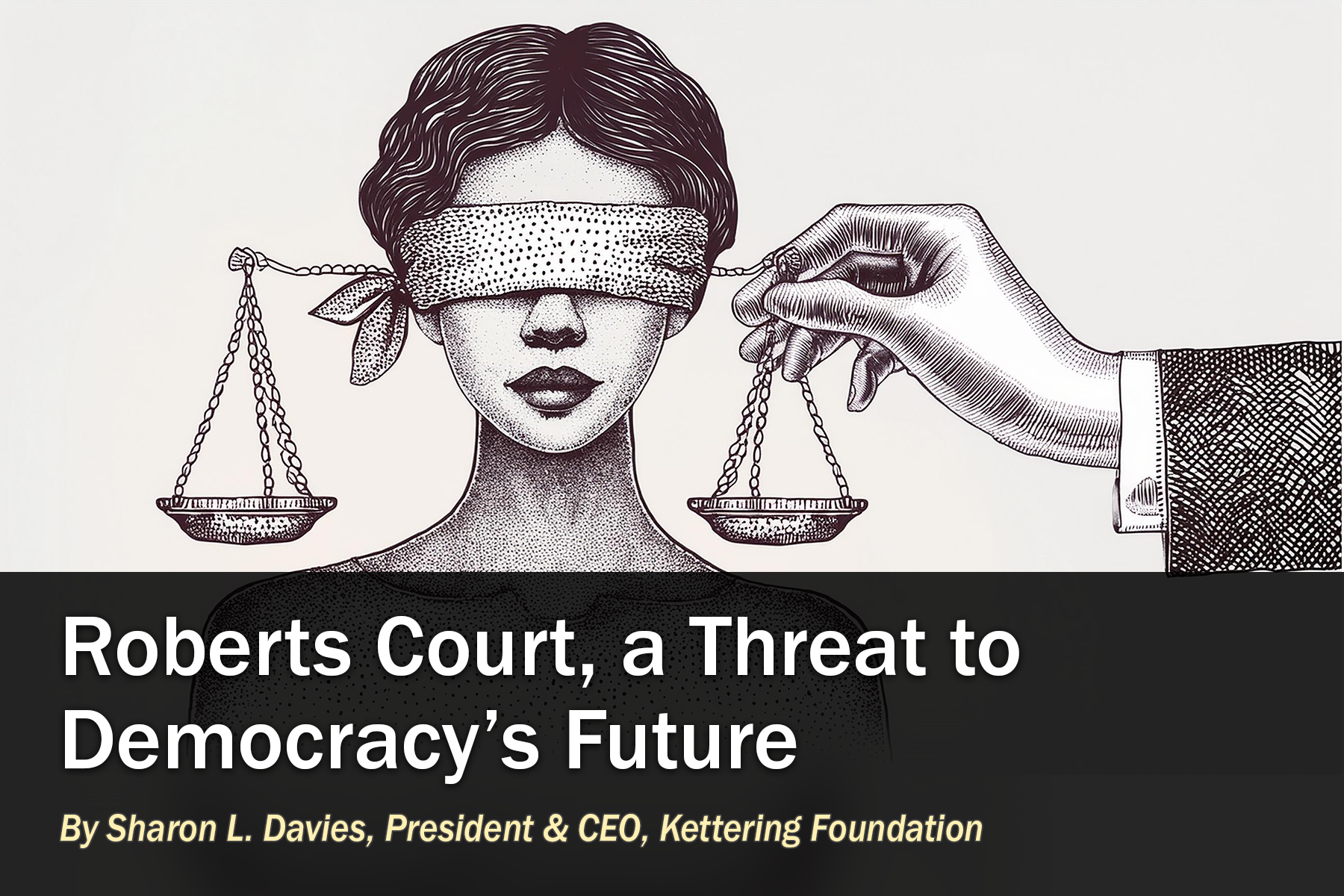Anti-LGBTQ+ Violence and Authoritarianism: Defending Democracy Must Be Inclusive

Nex Benedict, a nonbinary high-school student, collapsed and died February 8, 2024, the day after a fight in their school’s bathroom in Owassa, Oklahoma. The incident sparked widespread outrage and has reignited a painful overdue national conversation about societal attitudes amid an upsurge in legal campaigns trying to restrict LGBTQ+ rights. The rising violence and hostile rhetoric toward the LGBTQ+ population and other vulnerable groups continue to highlight the growing danger to American democracy.
Anti-LGBTQ+ Sentiment and Hate Are on the Rise
Hate crimes reported to the FBI trended downward through 2020 but have spiked in recent years, particularly in the 28 states that have passed laws targeting those who identify as LGBTQ+. Calls to national suicide and crisis hotlines have soared. From 2015-2019, an average of 108 crimes were reported against transgender people at schools per year. But in 2021 and 2022, the annual number rose to an average of 232. Apart from school incidents, more violent crimes have occurred against the LGBTQ+ community across the country. Fatalities have risen from 47 in 2022 to 53 in 2023, according to the National Center for Transgender Equality.
Hateful rhetoric and violence against groups that are perceived by some to be outside the norm are as old as America itself. But in the last eight years, hate crimes have doubled against Black Americans, Jewish Americans, those who are LGBTQ+, and other minorities. The number of reported hate crimes rose to more than 11,000 in 2022, which is double the number from 2014.
Legislative Campaigns Target LGBTQ+ Rights
Oklahoma, Benedict’s home state, has been focused on fighting the acceptance of trans people. Last year, Oklahoma’s state legislature proposed 40 bills aimed at blocking gender-affirming care, banning the discussion of gender orientation in the classroom, and blocking changes to gender on birth certificates, among other issues. In 2024, more than 50 bills were proposed, according to the Oklahoman, the daily newspaper of Oklahoma City. Most proposals did not advance and will not be eligible for a vote this year.
Yet Oklahoma is far from being alone in the anti-transgender stances of its public officials or its legislature’s zeal to fashion laws that curb transgender and nonbinary rights. Hundreds of proposals targeting LGBTQ+ people are under consideration across the country, and many have passed. The rise in violent rhetoric and incidents last year corresponded to the incredible number of over 500 anti-transgender bills introduced in legislatures across the country, according to American Civil Liberties Union data. This is more than the total number of anti-trans bills introduced in the previous five years, according to the 2023 Remembrance Report and the Trans Legislation Tracker, a website that tracks anti-trans legislation nationwide. Laws banning gender-affirming care have passed in more than 20 states. The rise in the introduction and passage of proposals targeting LGBTQ+ individuals kept pace with the rise of antidemocratic, Christian nationalist rhetoric coming from the extreme right-wing of the Republican Party. These laws endanger all who identify as LGBTQ+. As the bullying and hatred are escalating, democracy as a whole is also threatened.
A Familiar Pattern
Many conservatives (as well as Trump) openly admire authoritarian leaders such as Viktor Orban, the prime minister of Hungary. Orban has curtailed independent media, likened liberalism to a “virus,” and signed a variety of anti-LGBTQ+ laws in the last several years. America’s Conservative Political Action Conference (CPAC) met in Hungary at Orban’s invitation in 2022 and plans to do so again this spring. As Ivan Lemziakov and Yelena V. Litvinov have written for this series, Russia has similarly curbed gay and transgender rights for 20 years, and has even classified the “international LGBTQ+ movement” as an “extremist organization.”
With the rise of Christian nationalism and its support for illiberal policies, the rhetoric and violence against the LGBTQ+ population appears to correlate with an increasing support for exclusionary tendencies on the part of the American right. The GOP might not yet meet the definition of a fascist party, but the similarities are deeply disturbing. International affairs expert Tom Nichols argues that the GOP’s political base has become an “authoritarian, violent, seditionist personality cult bent on capturing and exercising political power solely to benefit its own members and punish its imagined enemies. Is that fascism? For most people, it’s close enough.” The rhetoric and bullying against LGBTQ+ people, and the laws targeting their rights, are part of the extremist right-wing’s weakening commitment to democratic norms and its willingness to eschew diversity.
Now Is the Time for Change
In the 19th century, the orator and abolitionist Frederick Douglass had three words of advice when asked what could be done to preserve the rights of Black people: “Agitate! Agitate! Agitate!” In that vein, there have been many protests across the country since the death of Benedict. The Human Rights Campaign urges people to, among other actions, attend public demonstrations to show support for the rights of LGBTQ+ people, speak out whenever possible, and urge the US Congress to pass the Equality Act, which could amend the Civil Rights Act of 1964 to forbid discrimination against LBGTQ+ people.
Change, when and if it comes, will come too late for Nex Benedict. The challenge now is to ensure that change does not come too late for others and that a more tolerant, open, and just society can become a constant state for everyone.
Maura Casey is a former editorial writer for the New York Times and has worked with the Kettering Foundation since 2010.
From Many, We is a Charles F. Kettering Foundation blog series that highlights the insights of thought leaders dedicated to the idea of inclusive democracy. Queries may be directed to fmw@kettering.org.








